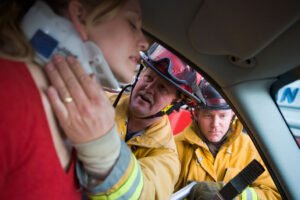Emotional Impact Of PTSD And Driving Phobia Post-Accident
Car accidents can have a devastating emotional impact, leaving many individuals feeling afraid to drive or suffering from Post Traumatic Stress Disorder (PTSD) and driving phobia post-accident. This article will explore the causes of PTSD driving phobia, its symptoms, and the treatment options available to victims of such emotional trauma. It will also discuss the potential legal steps individuals can take to seek compensation for their emotional distress. Finally, it will look at the long-term effects of PTSD and fear of driving post-accident.
Fear of Driving Causes
Fear of driving, which is also known as vehophobia or driving phobia, can be caused by a variety of factors and is often a symptom of Post-Traumatic Stress Disorder (PTSD). PTSD is caused by a traumatic event, such as an accident or a natural disaster, that impacts an individual’s mental and emotional well-being.

As mentioned, the most common cause of a fear of driving is a traumatic event that an individual has experienced. This event can be anything from a car accident to a childhood experience where someone was in a car with an intoxicated driver. Other causes can include anxiety and panic attacks caused by an individual’s fear of the unknown and worries about potential danger.
It is common for someone who has experienced a life-changing event to be left with lingering fear and anxiety. This can lead to heightened panic and stress when they encounter situations that may trigger their past trauma. And if the case involves driving, they may feel a strong sense of fear and dread. This can cause them to avoid driving altogether or even lead to panic attacks while driving.
Sadly, fear of driving can lead to depression in some individuals, as they may feel helpless or trapped in their minds. This can lead to further emotional and mental health issues and make it difficult for an individual to lead a normal life.
When a traumatic event causes fear of driving, seek help and support from a qualified professional. A professional can work with a person to understand and manage their fear and help them find healthier ways of coping with their anxiety and stress. This can enable them to regain control of their life and eventually regain the confidence needed to drive a vehicle.
Post-Traumatic Stress Disorder (PTSD)
Post-Traumatic Stress Disorder (PTSD) can often be triggered after a traumatic event like a car accident. In some cases, the individual may experience an intense fear of driving or avoidance of all driving-related activities. This can severely impact their everyday life, as they may feel unable to leave their home and engage in the activities they once enjoyed. This can be particularly concerning when the individual must drive for work or family commitments. In addition, they may experience a heightened sense of anxiety and panic when they are in a vehicle or even in a parking lot.
Fear of Driving
After an accident, it is common for people to develop a fear of driving. This fear, often referred to as driving phobia, can have a significant emotional impact on those already suffering from post-traumatic stress disorder (PTSD). Sufferers of PTSD may experience intense anxiety or panic when looking at a vehicle, or the mere thought of sitting behind the wheel can cause a feeling of terror. Signs of driving phobia can include difficulty focusing while driving, avoiding routes that bring back memories of the accident, and developing a fear of driving on highways or in unfamiliar areas.
Symptoms
Post-traumatic stress disorder (PTSD) can have a significant emotional impact on someone who witnesses or experiences a traumatic event, such as a car accident. This type of trauma can lead to a fear of driving, also known as vehophobia or amaxophobia. Someone who develops a fear of driving after a traumatic event may experience a wide range of symptoms.
The most common symptom of a fear of driving is intense anxiety. This can manifest itself in any number of ways. For instance, someone may feel a heightened sense of alertness or dread when approaching or driving near a scene of the accident. They may also experience a racing heart rate, shallow breathing, and sweaty palms.
Physical Symptoms
The fear of driving can also manifest itself in physical symptoms. For instance, someone may experience an uneasy feeling in their stomach or have difficulty concentrating while driving. This can lead to a sense of fear or anxiety while they’re behind the wheel, which can be significantly disabling if someone needs to go to work or take their family on long trips.
Physical symptoms of post-traumatic stress disorder (PTSD) or driving phobia caused by a traumatic car accident may include increased heart rate, rapid breathing, and sweating when thinking of or being exposed to the situation that induced the traumatic experience. Those with driving phobia may experience these symptoms when driving or even when in the presence of automobiles. Physical symptoms may also include trembling, trembling hands, and difficulty concentrating. Furthermore, a fear of driving can manifest in behavior changes, such as avoiding certain roads or routes and avoiding or minimizing driving distances.
Behavioral Symptoms
The fear of driving after a traumatic event is often a natural reaction. It’s important to recognize these symptoms to address them promptly. Working with a doctor or mental health professional can be beneficial in overcoming this fear and regaining the freedom to drive. In severe cases, patients may totally avoid driving, unable to get behind the wheel. This fear can be extremely disabling, preventing individuals from engaging in daily activities such as going to work or running errands. Additionally, this fear may have an emotional toll, leading to feelings of guilt or depression.
Another common symptom of a fear of driving is avoidance behavior. This can include avoiding driving entirely, taking routes that are well away from the site of the accident, or driving at slower speeds out of fear of something going wrong. This avoidance behavior can also lead to feeling like one’s freedom is being limited, which can cause further anxiety.
Cognitive Symptoms
Finally, the fear of driving can lead to social isolation. As a result, someone afraid to get behind the wheel may avoid going out with friends or family. This can lead to feelings of loneliness and depression, which are common among those who suffer from this type of anxiety.
Cognitive symptoms of PTSD and driving phobia post-accident can manifest in several ways. These can include an irrational fear of driving, flashbacks of the accident, detachment from reality, difficulty concentrating, and ruminating thoughts. People with PTSD and driving phobia post-accident often develop a fear of driving, regardless of the severity of the accident. This fear can be described as an irrational fear that can interfere with the person’s ability to drive. The fear can manifest in various ways, such as avoiding certain roads, times of day, or destinations. The fear of driving can lead to other cognitive symptoms, such as difficulty concentrating, detachment from reality, and ruminating thoughts. Those impacted by PTSD and driving phobia post-accident need appropriate intervention and treatment to manage and minimize these cognitive symptoms.
Treating Post-Accident Vehophobia
Fear of driving after a traumatic event or accident can be difficult to overcome, with many people experiencing PTSD or driving phobia for years. Due to the trauma’s emotional, physical, and psychological impact, symptoms can be severe and impede daily activities. Although the healing process may take time, treatment options are available to help those affected.
Psychotherapy is the most common type of treatment for PTSD, to help the individual understand their reactions and apply new coping skills. Cognitive-behavioral therapy (CBT) is a form of psychotherapy that is particularly effective in managing the fear of driving. CBT helps individuals identify and analyze the thoughts, feelings, and behaviors that trigger their fear and teaches them effective techniques to manage these triggers.
Medication can also be prescribed to manage anxiety, depression, and other symptoms of PTSD, which may exacerbate fear of driving. A mental health professional can help determine which type of medication is most appropriate in each case.
Some people may find exposure-based therapy to help overcome the fear of driving. The exposure-based treatment gradually and systematically exposes the individual to the situation or activity that causes fear or anxiety in a safe and controlled way. By desensitizing the individual to the situation, the anxiety can be decreased and eventually eliminated.
Participating in support groups with other individuals who share the same experience and fears can also benefit those affected by the fear of driving due to a traumatic event. These groups provide a safe, understanding environment where individuals can discuss their experiences and receive support.
Finally, relaxation techniques such as meditation, yoga, and mindfulness can help individual manage their symptoms of PTSD and anxiety. These techniques encourage the individual to focus on the present moment and can help them become more aware of their emotions and how they respond to them.
Fear of driving is a challenging issue to overcome, but with the proper treatment, it can be managed. Seeking support from a mental health professional or a treatment program can help those affected learn how to cope with their fear and gain the confidence to get behind the wheel again.
Can I get compensation for anxiety after a car accident?
Following a car accident, many people experience post-traumatic stress disorder (PTSD) and a fear of driving. For some, this can prevent them from being able to travel by car, leading to a loss of mobility and greater reliance on other forms of transport. Those affected may be able to pursue a personal injury claim to seek compensation for their injuries and loss of mobility.
PTSD, in particular, can present severe psychological and emotional issues that necessitate professional counseling and therapy and prevent those affected from being able to drive again. In this case, it is possible to seek compensation for the anxiety and fear that results from the accident and the subsequent PTSD.
For example, if you feared driving before the accident but could drive cautiously, such caution may now be non-existent due to PTSD. You could seek compensation for the additional potential dangers posed by lack of caution in driving and for anxiety and fear of the prospect of driving.
Making a personal injury claim following an accident can be lengthy and complex, so it is recommended to seek legal advice to understand the full extent of the claim and the options available better.
Compensation for Emotional Distress
If you were involved in a car accident and have since developed a fear of driving or PTSD, you may be eligible to receive compensation for emotional distress. The compensation awarded will depend on the severity of the PTSD or driving phobias and may include medical bills, property damage, lost wages, and pain and suffering.
Driving phobias and PTSD can cause severe emotional distress and disrupt daily life. Those who suffer from driving phobias or PTSD after a car accident may be entitled to compensation for their emotional distress. The amount of compensation a person can receive for emotional distress is based on several factors, including the magnitude of the trauma experienced, the type of symptoms experienced, the duration of the condition, and the impact it has had on their life.
With driving phobia, symptoms can range from fear and anxiety to complete avoidance of the activity. This can lead to problems such as an inability to commute to work, a lack of participation in leisure activities, or simply a fear of being in a vehicle. If the person experiences severe distress or avoidance due to the driving phobia, they may be eligible to receive compensation.
In PTSD, there are a few common symptoms associated with it that should be considered when determining the amount of compensation a person may receive. These include nightmares, intrusive thoughts, flashbacks, difficulty sleeping, difficulty concentrating, and feelings of guilt, shame, or fear.
When evaluating the amount of compensation for emotional distress due to a car accident, the court will consider the severity, the length of time the condition has lasted, and the seriousness of its impact on the person’s life. Therefore, the amount of compensation awarded will vary based on individual cases.
If you or a loved one has suffered severe emotional distress due to a car accident, it is important to speak to a lawyer to determine what compensation may be available to you. A lawyer will be able to evaluate your case, explain the legal process, and provide guidance on maximizing your chances of receiving the highest possible compensation for your emotional distress.
If You Did Not Suffer Injuries
If you were involved in a car accident and did not suffer physical injuries, it is common to experience emotional distress and a fear of driving. Even in cases where the accident was minor, and you did not suffer physical harm, the emotional impact can be significant.
One of the most common responses is a fear of getting behind the wheel again. This fear may include a feeling of uneasiness and discomfort when driving in general or when driving on the same route as the accident. This fear may be accompanied by anxiety and flashbacks to the accident.
Not only can this fear interfere with driving, but it can also lead to feeling overwhelmed, stressed, and isolated. You may feel overwhelmed by the information you are trying to process related to the accident. You also may feel uncomfortable around other drivers and constantly watch for danger.
If You Suffered Other Injuries
If you experienced physical injuries in addition to PTSD and fear of driving post-accident, your recovery journey could be difficult. While it may seem impossible to cope with the trauma and fear of driving, you can take proactive steps to slowly and safely regain your confidence to get back behind the wheel of a car and drive.
Immediately after being involved in an accident, you may experience a wide range of physical injuries. These can range from minor scratches and bruises to more severe injuries. If you have serious physical injuries, seeking medical attention and treatment is important. Working with a medical professional and physical therapist can help you set realistic goals for getting back on the road.
Your fear of driving post-accident may be increased due to the trauma you experienced and the physical pain you endured. It is common to feel anxious or scared to drive after an accident. Taking things slowly and building up your confidence and sense of security is essential.
What are the long-term effects of PTSD and driving phobia post-accident?
The long-term effects of post-traumatic stress disorder (PTSD) and driving phobia post-accident can be emotionally and psychologically significant. This can lead to decreased quality of life and increased social isolation due to the fear of getting behind the wheel again.
One of the long-term effects of PTSD and driving phobia post-accident is the fear of driving. This fear can be powerful and lead to many individuals avoiding driving altogether. This avoidance of driving can seriously affect the overall quality of life, as transportation is necessary for most day-to-day activities. Individuals with driving phobia are also at greater risk of social isolation due to limited access to activities and places they would otherwise enjoy.
Another long-term effect of PTSD and driving phobia post-accident is increased anxiety. Those with PTSD and driving phobia are more likely to experience heightened anxiety, including intrusive memories, nightmares, and an exaggerated startle response. This can be debilitating for those affected and significantly impact their environmental interactions.
Additionally, PTSD and driving phobia post-accident can lead to depression and decreased self-esteem. Those affected may feel a sense of guilt and helplessness due to the trauma of the accident, leading to a decrease in their overall self-worth. Depression can also occur due to the lack of contact with friends and family and the lack of involvement in activities that they once enjoyed.
Conclusion
In conclusion, PTSD and driving phobia post-accident can have a profound emotional impact on individuals. While the symptoms of PTSD and driving phobia can often be managed with the proper care and support, seeking out the appropriate medical and mental health care and reaching out to support groups are all steps that can help alleviate the symptoms of these conditions.
Contact a Pembroke Pines car accident attorney to be aware of the possible legal remedies available to individuals who have suffered PTSD and driving phobia post-accident, such as the potential for seeking compensation for emotional distress. It is crucial to recognize the long-term effects of PTSD and driving phobia post-accident and to take the necessary steps to address and manage these symptoms to ensure the individual’s physical and mental well-being.






